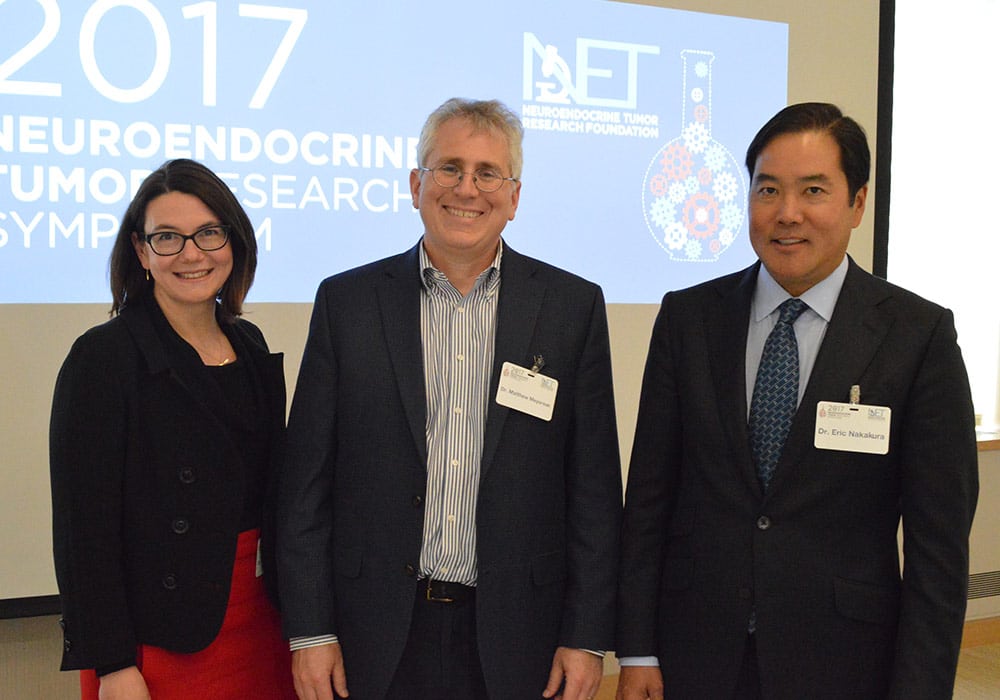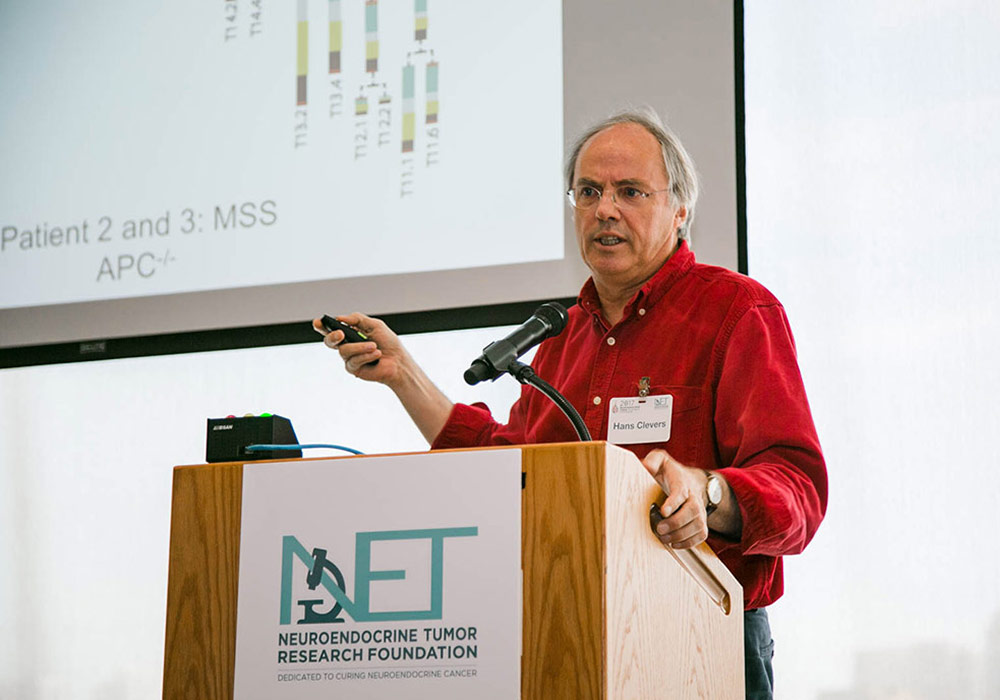(April 25, 2017, Boston, MA)—The Neuroendocrine Tumor Research Foundation (NETRF) today announced its largest research commitment ever—$4 million in collaborative grants—most from its new Accelerator Grants program to study neuroendocrine tumors (NETs), a widely misunderstood, commonly misdiagnosed cancer type, without adequately identified genomic drivers.
Accelerator Grants recognize innovative and transformative research of NET drivers, capable of expanding our understanding of the disease and informing personalized treatment options. They are funded as part of a $15 million gift to NETRF by the Margie and Robert E. Petersen Foundation.
– Ron Hollander, executive director, NETRF
– Effie Tzameli, Ph.D., director of research, NETRF
– George Fisher, M.D., co-chair, Board of Scientific Advisors, NETRF.
The 2017 NETRF projects investigate how and why neuroendocrine cells become cancerous. Researchers will use genomic sequencing, gene editing, and bioengineering approaches to look for specific changes in DNA, RNA, proteins, cells, and mini-organs to find and exploit key vulnerabilities.
Daniel Chung, M.D., co-chair, Board of Scientific Advisors, NETRF, announced the 2017 grants as part of today’s NETRF Annual Scientific Symposium in Cambridge, MA.
Accelerator Grant Awards
-
Epigenetic regulators of intestinal endocrine cells and carcinoid tumors
Qiao Zhou, Ph.D., Harvard University; Ramesh Shivdasani, M.D., Ph.D., Dana-Farber Cancer Institute
Zhou, Shivdasani, and colleagues will combine their expertise in stem cell biology with cutting-edge technologies to understand how neuroendocrine stem cells, the original cells, can go awry and give rise to tumors, and how tumor cells are different, in terms of growth and function. They aim to identify mistakes in cellular proteins that can be corrected with targeted therapies. -
Finding the cause of small intestinal neuroendocrine tumors (SI-NETs)
Matthew Meyerson, M.D., Ph.D., Dana-Farber Cancer Institute, Harvard Medical School; Eric Nakakura, M.D., Ph.D., University of California, San Francisco; Chrissie Thirlwell, B.Sc., M.D., Ph.D., University College London Cancer Institute
In an international collaboration, Meyerson, Nakakura, Thirlwell, and colleagues will analyze SI-NETs specimens to look for inherited or acquired (that cannot be transmitted to the next generation) changes in the genome. The team will also sequence cells very close to the tumors to look for the earliest indications of SI-NETs. Additional analyses will evaluate whether environmental or infectious agents can lead to genomic alterations. - Modeling neuroendocrine tumors using adult stem cell-derived organoids
Hans Clevers, M.D., Ph.D., Hubrecht Institute, Netherlands
Clevers and colleagues will engineer a “living biobank” of intestinal carcinoid and pancreatic NET tissue. Stem cells from healthy and tumor tissue specimens will be grown into organoid or “mini-organs” in a dish. The team will test whether certain genomic changes lead to the development of tumors, in healthy organoids. They will use the NET organoids to test sensitivity to various drug treatments.
Petersen Investigator Grant Award
- The role of ATRX/DAXX/H3.3 chromatin regulation in pancreatic neuroendocrine tumors (panNETs)
Laura Banaszynski, Ph.D., UT Southwestern Medical Center
Banaszynski and colleagues will study two key proteins involved in the development of NETs, which are found mutated in 43% of panNETs. They will test the hypothesis that these proteins function to stabilize DNA and that the mutated proteins are not able to stabilize the genome, eventually leading to tumor formation.
Pilot Project Grant Award
- Mutational landscape of pancreatic neuroendocrine tumors using the “liquid biopsy”
Nitya Raj, M.D., Diane Reidy-Lagunes, M.D., Memorial Sloan Kettering Cancer Center
To support the application of minimally invasive targeted therapies in panNETs, Raj and colleagues will evaluate how accurately analysis of cell-free DNA from blood samples can detect genetic changes in tumor DNA, as compared to those in tissue biopsies, which could help inform treatment options for patients.
NETRF funds research to discover cures and more effective treatments for carcinoid, pancreatic, and related neuroendocrine cancers. With these grants, NETRF has now funded over $16 million in large-scale, multi-year NET research grants to leading scientists at renowned research institutions, including the top cancer centers in the U.S. and beyond. For more information go to netrf.org.



